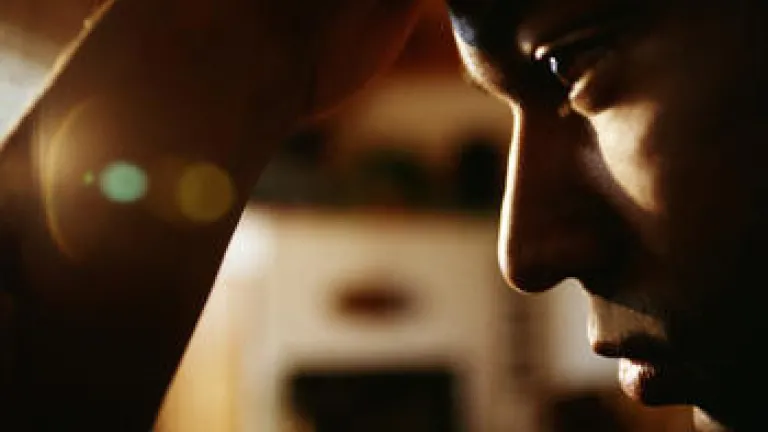The Human Side of Homosexuality: From One Who Has Struggled

Homosexuality and the gay-rights movement are one of many battlefields in today's culture wars. Does the Bible offer hope for those struggling with same-sex attraction? A Christian who's wrestled this problem shares his perspective.
Since the late 1960s, the issue of homosexuality has "come out of the closet" from the depths of social stigma and shame to becoming one of Western society's most controversial and divisive issues.
Culture wars have polarized both sides of the issue as conflicting information, misinformation and misunderstandings swirl through society. In the past many people found it easier to simply condemn those with same-sex attractions without understanding the deep-seated human struggle involved in avoiding a lifestyle the Bible clearly condemns.
How and why did the issue of homosexuality become one of the most controversial issues of our time? And how can a Christian struggling with same-sex attraction begin to change in order to live a balanced Christian life? This article is an open letter from a man who has experienced the conflicting struggles of same-sex attraction and his Christian calling.
Roots of culture war
In the late 1960s, as a backlash to how homosexuals were often mistreated, gay activists began organizing efforts to change public perceptions. These efforts began to propel the homosexuality issue into wider public view. Extricating themselves from hurtful treatment became the roots of their cultural war for homosexual rights. In their view they deserve "equal rights" as a matter of fairness.
They demanded to be treated with dignity and have pushed hard for society to regard homosexuality as an accepted alternative lifestyle. This has resulted in bitterness, anger and mistrust between gay activists and those who oppose them.
Instead of trying to understand the concerns of those on both sides of this controversial issue, the cultural war has degenerated into extreme polarization and near militant positioning on the issues. This has often sparked deep alienation, mistrust and condemnation.
To many religious people, homosexuality is perceived as primarily an issue of immorality and behavior based on choice. Those who fight to uphold traditional Christian precepts have often declared their belief that homosexuals have chosen to be that way and harbor an agenda to bring down society through their immoral behavior.
Far too often they have looked on homosexuals as the worst of sinners. They have cited the Genesis 19 account of Sodom and Gomorrah to consign the person with homosexual attractions to the depths of loathing or even ridicule and persecution. Yet God's Word takes the approach of hating the sin but loving the sinner (John 3:16-17).
As I once did, many with same-sex attractions feel misunderstood and summarily condemned without an effort from others to understand their circumstances.
This condemning approach has left many Christians who struggle with homosexual attractions to live in shame, self-loathing and alienation. Some have given up on religion altogether because they feel it offers only condemnation and no hope for redemption, forgiveness or understanding of their struggles.
A conscious choice?
One of the underlying causes behind this culture war is misunderstanding by many of the root causes behind same-sex attraction. For many it has been easier to condemn those with homosexual feelings without taking the time to understand where they are coming from.
Yet Christians are instructed in God's Word not to condemn the person but to encourage those struggling with any temptation to resist sin and follow Christ's example. Christians are instructed to take on the mindset of Jesus Christ: "For God did not send His Son into the world to condemn the world, but that the world through Him might be saved" (John 3:17; see also Luke 6:37-38).
Like me, many (and perhaps most) homosexual people did not consciously choose their sexual and emotional orientation. I remember having these feelings since I was a boy. Looking back today I can remember having some degree of gender identity confusion. I believe this was related to my stressful family environment.
I had a conflicted, emotionally abusive relationship with my mother and a distant relationship with my father. I did not realize that my natural need for fatherly love and affirmation was unconsciously melding with my developing sexual attraction. I didn't ask for my homosexual feelings or my pain in conflict or my sense of shame, but I had them all! I didn't know what to do in order to feel "normal" like other boys.
Although some dismiss it as an outdated theory, a number of authorities say that this type of classic "distant father" relationship is a recurring factor in the development of homosexuality. I can't speak for others, but it was a factor in my life.
Many homosexuals resist change because they often feel they were simply born biologically with same-sex attraction. Many have assumed a genetic component to be a factor, though extensive searches for a "gay gene" have been fruitless, and studies of identical twins where one was gay and the other straight appear to disprove the idea that genetics is the cause.
This is also consistent with biblical teachings about God being the Creator of all things. It doesn't make sense that God would cause or allow someone to be "born" as a homosexual. But one's sexual identity and attractions begin to form with one's earliest experiences, sometimes beginning shortly after birth.
Yet regardless of cause, for most of those with same-sex attraction that's all they remember, and the attraction feels natural—a deeply inherent state of mind that defines personal identity. To them, to challenge their homosexuality is to denigrate their personal worth as a human being.
Hope for homosexuals
Because of the deep-seated nature of this identity, those who desire to change can find it a difficult and painful experience. It took many years of personal struggle, burdened with fear of condemnation, emotional confusion and anger toward God and other people, to begin to change my perspectives.
As a young man, my struggle to stay out of the gay lifestyle was excruciatingly painful. I was giving in to temptation as I searched for love and affection in the gay community. My church pastor intervened with some "tough love," which forced me to make a crucial life-changing decision—follow Jesus Christ or act out on my same-sex attractions.
I could not do both. I had to force myself to walk by conviction of my Christian beliefs and not by personal desires.
Through years of struggle, I have come to see (as all Christians eventually do) that I was not made to be self-sufficient. I cannot convert myself from selfish desires to God's divine nature by my own willpower alone. Apart from God's mercy and power, I am ultimately helpless and hopeless.
With the help of my pastor, supportive brethren and, most of all, the strengthening from our Savior Jesus Christ, I was able to begin to change my life.
Today I continue to fellowship in my church congregation. I have learned to live as a celibate man in a manner similar to that of other single men in the congregation.
I've come to more clearly discern the magnificent purpose and plan that our Creator has for me personally and all of mankind. It's a plan that centers on our relationships with God and fellow human beings (Matthew 22:37-40).
For someone who has left a homosexual lifestyle, the experience of building Christian friendships is critical to a successful Christian walk. Struggling in isolation is debilitating and eventually destroys the motivation and will of the one struggling. Receiving encouragement and support from other Christians, as I eventually did, helped me change my life.
However, as crucial as human support is, what has been even more vital to motivating me to choose to embrace and maintain a repentant way of life was coming to believe that God really loves me.
I remember earnestly praying to God that if He really did love me then would He please help me more deeply understand and believe it. He did! God answered my prayer by granting me a deeper discernment of His divine nature.
With that deeper discernment about God's love, my uncertainty was replaced with faith that God really does love me. After all, His very nature is that of love (1 John 4:8, 1 John 4:16). He loves every human being—including those struggling with same-sex attraction.
In addition, I have come to understand that my relationship with God was possible only because God first reached out to me to begin a relationship—while I was still in my sins (Romans 5:8). I have come to see that it was the mercy and kindness of God—the goodness of God—that helped me change my life (Romans 2:4).
Yet, like other Christians, I often feel like the apostle Paul as he described his struggle with his human nature in Romans 7 and 8. Paul had repented and had been converted for 20 or so years when he described his continuing struggle with his fleshy, carnal nature. Paul rejoiced that Jesus Christ would help him get through his struggles and save him from sin and the condemnation of death: "There is therefore now no condemnation to those who are in Christ Jesus, who do not walk according to the flesh, but according to the Spirit" (Romans 8:1).
Choose change
I and others are living proof that there is hope for homosexuals who have chosen to change their lifestyle. God answered my earnest prayer, and I now know that He loves me. Although I still feel same-sex attraction, the struggle is often a shadow of what it used to be. Knowing that God loves me has motivated me to want to please Him and maintain a repentant life.
Though I did not consciously choose my same-sex attraction, it is true that behavior is based on choice. Everyone can choose to not engage in wrong sexual behavior as Christians are directed (Jude 7; 1 Corinthians 6:18; 1 Corinthians 10:8).
The apostle Paul knew he was saved by God's grace through faith. Yet he also knew that coming under the grace of God—making his reconciliation and relationship with Jesus Christ and the Father possible—must not be denigrated or disrespected! Paul warned early Christians in Rome to not twist grace into license to sin: "What then? Shall we sin because we are not under law but under grace? Certainly not!" (Romans 6:15).
The Bible warns that people who refuse to repent of sin—including all forms of sexual sin—will not be a part of the Kingdom of God (1 Corinthians 6:9-10). But at the same time it offers hope for those caught up in many sins, including homosexual behavior (1 Corinthians 6:11).
Ceasing to live an immoral lifestyle, whether homosexual or heterosexual, and resisting placing ourselves in tempting situations is a conscious choice we must make in order to flee sexual immorality (1 Corinthians 6:18).
When we commit our lives to God we can receive extra help to change our lives. As our High Priest, Jesus Christ sympathizes with our weaknesses. He has promised to show mercy and provide grace to help in time of need (Hebrews 4:14-16).
It is also important to understand the difference between homosexual orientation and homosexual lust and behavior. The orientation itself, while certainly a problem, is not a sin because we all have to deal with wrong desires of many kinds. But dwelling on those thoughts or acting them out with behavior is (Matthew 5:27-29). So we must with God's help resist. And indeed there are Christians like myself with homosexual or bisexual orientations who are coming out of a wrong lifestyle to live in accordance with God's instruction.
Compassion and encouragement
Christians can empathize with and encourage those who are making an effort to change from a wrong lifestyle. We should follow Christ's example of showing compassion, forgiveness and encouragement to any person trying to overcome sin.
Jesus set the Christian example of the perfect balance between being compassionate and encouraging while never condoning sin. When the scribes and Pharisees wanted to stone a woman caught in the act of sexual immorality, rather than joining in condemning her He expressed forgiveness and encouraged her to change. "And Jesus said to her, 'Neither do I condemn you; go and sin no more'" (John 8:11).
As Christ did, showing respect and love for others can be done without condoning wrong actions. In dealing with anyone struggling with homosexuality, realize that their experiencing respect and encouragement from others can go a long way in helping them change their lives. It certainly did for me.
The apostle Paul reminded Timothy that Christ Jesus came into the world to save sinners (1 Timothy 1:15). We should avoid condemning others and provide encouragement and support for their efforts to change.
Sinful society growing worse
We live in a society that is degenerating in many ways just as Paul warned it would in the last days (2 Timothy 3:1-9). The psychological and social pathology of homosexuality is but one of many forces destroying lives today.
This world is under the sway of a powerful spirit being who is the archenemy of God and mankind. Satan the devil is the power behind society's evils and ills (2 Corinthians 4:4). His deception sits as a huge taproot feeding mankind's confusion about right and wrong, good and evil. This means the evils of society will only grow worse in the days ahead (2 Timothy 3:13).
Meanwhile we can strive to avoid the negative sexual influences all around us (James 4:7). What a blessing and a responsibility we Christians have to be called now to change from the wrong ways of life to the right ones. "For we are His workmanship, created in Christ Jesus for good works, which God prepared beforehand that we should walk in them" (Ephesians 2:10).
The only real solution to our society's ills will be Jesus Christ's coming intervention to change society for the better. All of humankind's emotional, psychological, sexual and physical problems will eventually be healed as His way of life begins to be taught worldwide in His glorious Kingdom (Isaiah 11:1-10).





